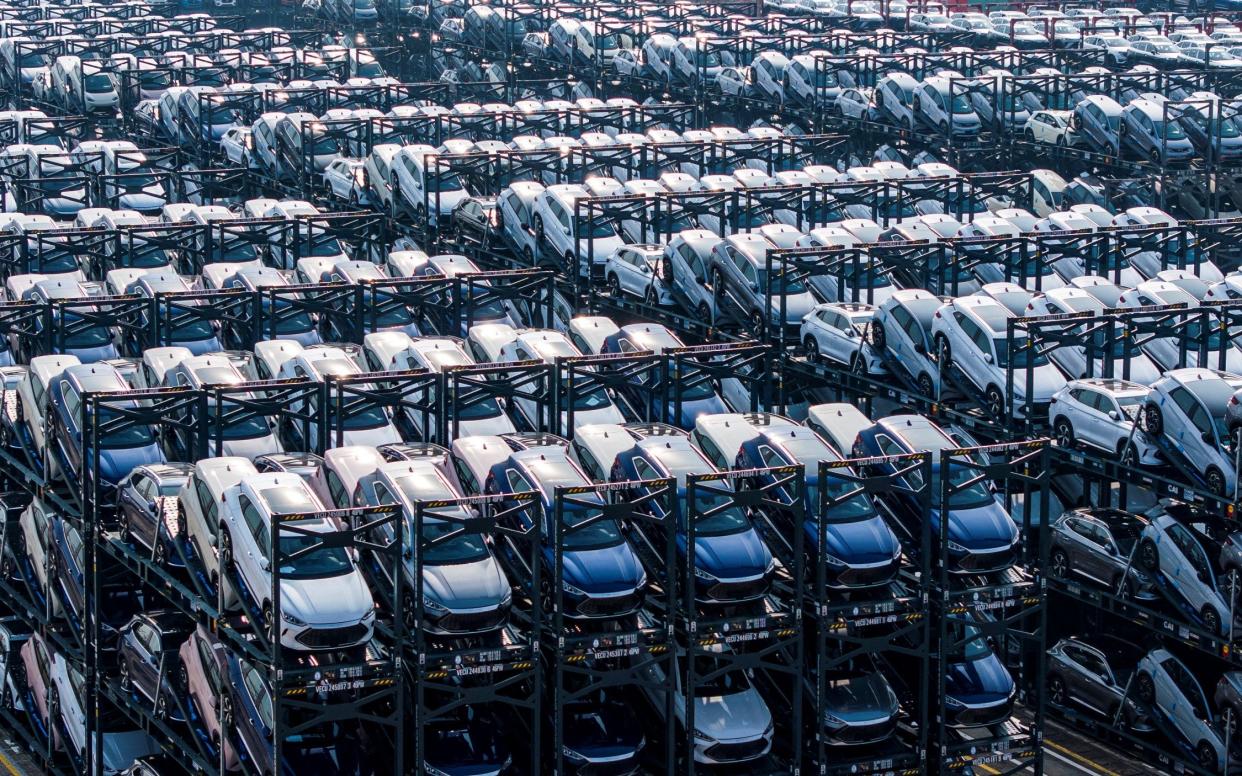The EU has just put its car industry on the road to destruction

The timing, to put it mildly, is slightly odd.
Any of us watching the start of the Euro 2024 football tournament this weekend may well have noticed the logo of the Chinese electric vehicle manufacturer BYD plastered everywhere in its role both as one of its main sponsors and as the “mobility partner” for matches staged across German cities.
In the same week, the European Union slapped punitive tariffs on imports of Chinese EVs. On the one hand Europe is welcoming the Chinese brands, and on the other it is telling them to get lost.
These mixed messages are typical of the EU’s hopelessly mismanaged response to electric vehicles. Its war on cheap Chinese imports is going to misfire spectacularly – and all it will do is end up destroying its once-mighty auto industry.
It has certainly been a tough few days for the Chinese electric vehicle giants planning to bring their brands to Europe. On Wednesday, the EU announced that it would impose extra tariffs on imports of up to 38pc, on top of the existing 10pc levies, putting almost 50pc in taxes on any cars Chinese brands bring into the bloc.
It follows a decision by US President Joe Biden to impose tariffs of 100pc.
At a stroke, the price advantage that the likes of BYD, Geely and Nio planned to use to force the market open and to start building a presence on the Continent has been wiped out. Chinese EVs will end up being a lot more expensive and the EU will rake in huge levies on each sale.
It is not hard to understand why the decision was made. Officials in Brussels are terrified that the Chinese EV manufacturers will wipe out the European auto industry, which still employs an estimated 13.8 million people, or 6pc of the total workforce, and generates €150bn (£130bn) of annual exports.
We can argue about whether the Chinese cars are subsidised by the state or are simply manufactured more efficiently by companies that have brilliantly mastered the technology in a very short space of time (the truth is probably somewhere between the two).
And yet leaving that aside, one point is certain: it will stall their advance. It is hard to compete when you face a 50pc tax on each car you sell.
The trouble is the policy is going to backfire spectacularly on the EU and of course on the UK if we are foolish enough to impose similar levies. There are three reasons for that.
First, anyone who thinks the Chinese will simply shrug their shoulders is simply kidding themselves. It will inevitably mean retaliation. There are already reports that China will respond with tariffs on large-engine imports from the EU, specifically targeting the high-end, luxury vehicles that sell best in that country.
Given that the EU exports €18bn of vehicles to China every year, and has even more money tied up in local joint-venture operations, that is going to be very painful for European manufacturers.
Tariffs may well be targeted at other EU goods as well. It is not as if China does not have a robust trade policy or that it is ever slow to defend its industries. In the wake of the announcement, €4.5bn was wiped off the value of the major German auto manufacturers as investors braced themselves for the inevitable response.
With grim inevitability, the EU’s giants will end up paying a high price and will end up locked out of what will soon be the world’s largest market. It is hard to see that as a great victory for anyone.
Next, the European manufacturers will inevitably grow flabby behind tariff walls. We have a long history of trade wars, tariffs and protectionism to teach us that the result is always the same. The protected industry does not have to compete anymore, it doesn’t bother to innovate and it simply puts up prices to milk easy profits out of customers who no longer have the choice of going elsewhere.
EVs are still a new technology, and there need to be huge improvements in driving range, battery life, vehicle weight and most of all price if they are to become the standard way of getting around.
That is only going to happen with ferocious competition between lots of different companies. Once a cosy cartel is established, they will just stagnate. The result? Even if they are protected at home, the European manufacturers will be steadily less competitive on the global market where they can’t hide behind tariff walls.
Finally, it is a tax that will be paid by European consumers. Some of us heard a rumour that governments across Europe were encouraging us all to switch to electric vehicles to help curb carbon emissions and hit our net zero targets. Now it turns out that they are also imposing massive levies on them.
All the mandates and quotas will still be in place, but the cars will be far more expensive, draining spending power out of the economy and taxing the transition to green energies. It would be hard to think of a more comically mismanaged policy, or one that is likely to do more damage.
In reality, even by the standards of incompetent officials in Brussels, it is a mess. The EU should have made sure it was competitive in EVs before imposing quotas and targets on the industry.
It should have made sure its own industry was ahead in technology and had worked out how to scale up production to deliver the low-cost cars that could take on the world.
It is too late to fix any of that now with tariffs. All it will end up doing is making a bad situation a whole lot worse. The EU will end up destroying one of its biggest and most strategic industries – and it will only have itself to blame.

 Yahoo News
Yahoo News 
